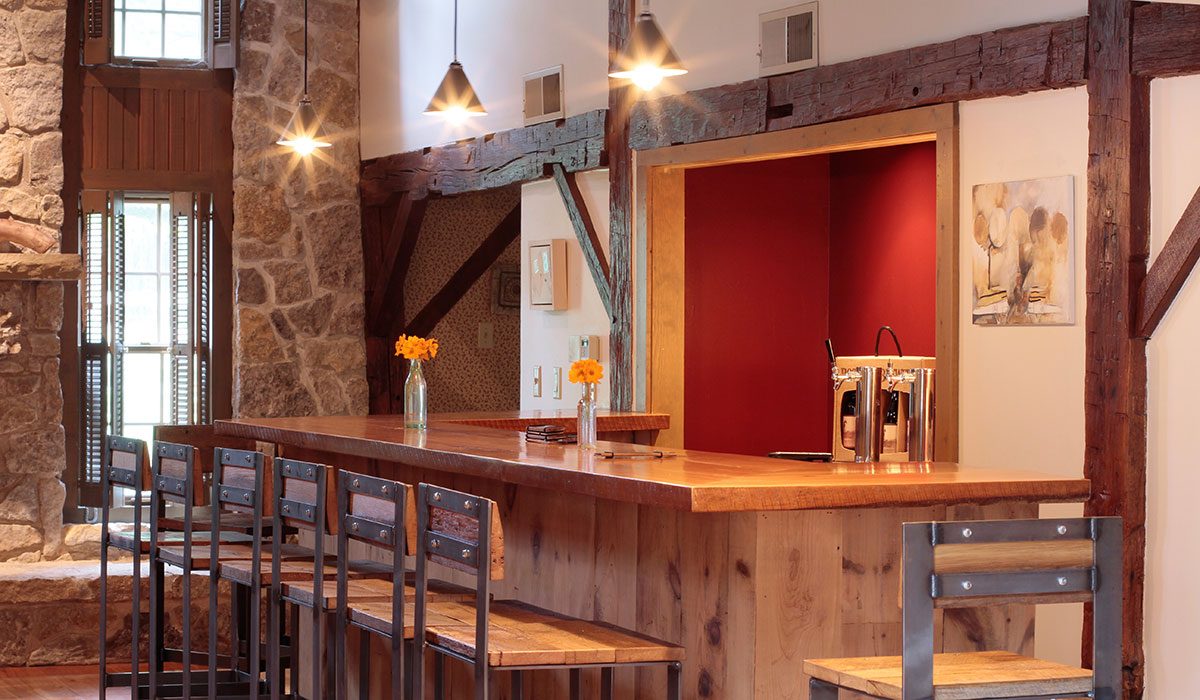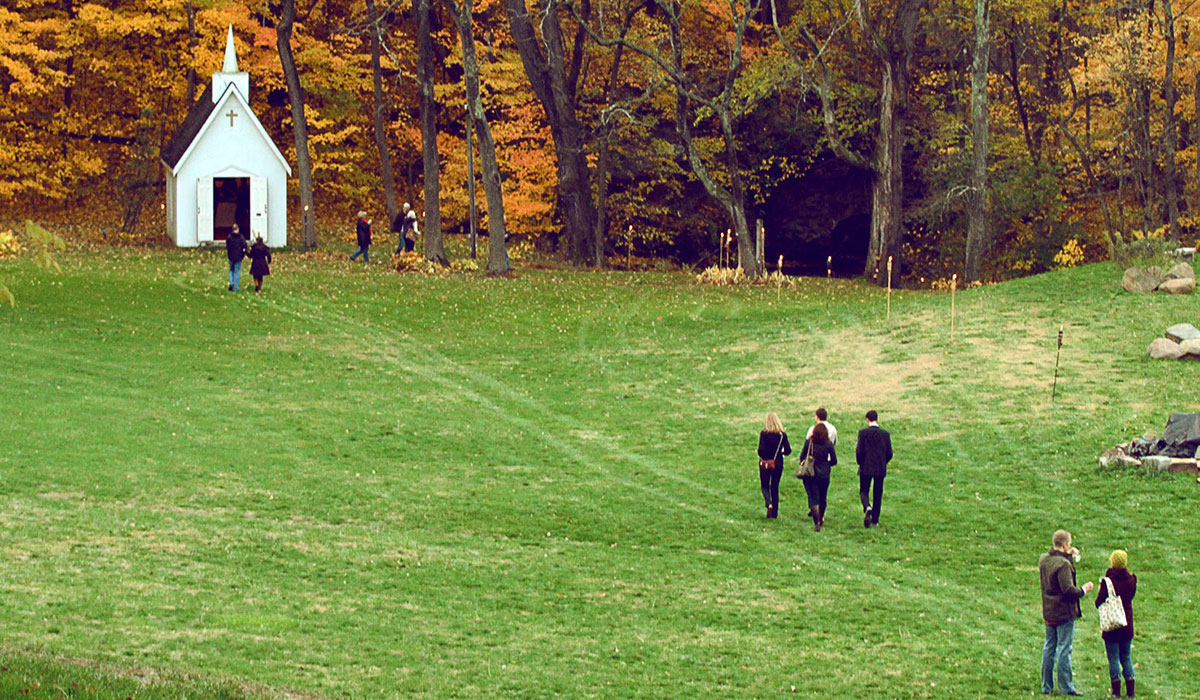Unpacking a picnic lunch at Ohio’s Rockmill Brewery has become part of the experience — as much as sipping a Belgian-style witbier while gazing out at the Hocking River, or holding a glass of Belgian-style saison while perched on a stool amid the hand-hewn log beams of the historic tasting room.
The brewery currently doesn’t offer a food menu — hence, the picnics spread across the rolling hills and long wooden tables. Later this year, however, owner Matthew Barbee will break ground on an expansion project to include a restaurant at the brewery, on a former horse farm 10 minutes from Lancaster and a half hour from Columbus.
(12 Breweries in Historic Buildings)
“These (beers) were built to pair with food,” says Barbee, who owns the brewery with his mother, Judy Jones.
Expansion in the Works for Rockmill Brewery
While Barbee says he can’t confirm when this year he will break ground, the project will involve a new brewery to replace the pole barn, built around 2000, that currently houses the brewing system.
“We’ve maxed out what that facility can handle,” Barbee says.
The current tasting room, originally a horse barn built in the 1870s and later converted into a house, will stay.
New storage buildings, holding stainless steel fermenters and resembling “a series of barns,” will line Lithopolis Road, acting as a “buffer” between the road and the quiet country atmosphere of the brewery, Barbee says.
The building housing the restaurant, along with an event space, likely won’t go up until next year, says Barbee. The brewery’s picturesque rural setting and the historical charm of the tasting room amid the rising popularity of craft beer have attracted growing numbers of weddings to the property.
(Founders of New Podcast “Help the Pour” Want to Spread the Good Word of Beer)
“We’re going to maintain that rural vibe of the horse farm,” Barbee says.

Barbee has axed plans for the boutique hotel originally included in the project. “We’ve kind of scaled back the vision for the area,” he says.
While Barbee shies away from the farm-to-table label, the renovation also will include the creation of a garden on the property. The new restaurant will make good use of that garden and will focus on “a chef being very creative” with menu options, says Barbee. It will be a different style menu than that offered at Barbee’s Rockmill Tavern, which opened in October in Columbus’s Brewery District and which Barbee describes as “high-end tavern fare.”
Barbee calls it a “fortuitous development” that the tavern ended up in the Worley building, which once served as the horse stables for L. Hoster Brewing Co. — a tie-in that perfectly maintains the rural aesthetic begun at the Lancaster brewery, which Barbee often refers to as simply “the farm.”
“I wasn’t expecting to take to it the way I did,” Barbee says of the Worley building space. He kept elements such as the floors and ceilings, and used reclaimed Ohio wood for the paneling and furniture.
The tavern will soon house production of Rockmill’s sour beer venture. Barbee calls it a “natural addition” to the brewery’s Belgian-style farmhouse ales and said he expects the first sour to be ready in about six months.
It’s a deliberate move that Barbee will produce the sours away from the farm. “The wild yeast and bacteria can be pretty invasive,” he says, “so you have to be careful not to cross contaminate.”
The farmhouse ales that attract customers to the brewery and the tavern developed out of what Barbee calls another “fortuitous development” — the discovery that the minerality of the water on his family’s farm is almost identical to the water in Belgium.
(RECIPES: Cook with Beer)
Fermentation Runs in the Family
Barbee’s grandfather, Floyd Jones, is a winemaker.
“I was always fascinated by viticulture and enology,” Barbee says.
He studied wine at Ohio’s Miami University, and later moved to Chicago to study with a sommelier. There, Barbee discovered a career in wine wasn’t for him, but knew he wanted to stay in the field.
While on the West Coast, he tried a saison for the first time and “loved it.”
He returned home to Ohio, to the farm his mother owned outside Lancaster.
The Hocking River, rife with blackhand sandstone, runs through the property. That sandstone “produces a very hard water, which is conducive to ales,” says Barbee.
Barbee had grown up on a different farm nearby. His grandfather had often told him: “You need to make wine with this water.”
(National Beer Day: Here’s to Choice, Freedom and the American Way)
At that time, Barbee says, he didn’t know the science behind the Hocking River’s water. “I knew it was delicious.”
Once he shifted his focus away from wine, he says, his vision became “100-percent saison farmhouse ale.”
To that end, the brewery opened its doors in September 2010 on his mother’s farm. When it first opened, Barbee says, he was excited at the prospect of creating a national brand.
“But craft beer became a big sensation here in the U.S.,” he says. That led to another shift in focus and to Barbee’s recent moves: creating dining experiences at the tavern and, soon, on the farm.
“We will continue to invest in the farm as a destination so more people can experience the origin of our brand,” Barbee says.
CraftBeer.com is fully dedicated to small and independent U.S. breweries. We are published by the Brewers Association, the not-for-profit trade group dedicated to promoting and protecting America’s small and independent craft brewers. Stories and opinions shared on CraftBeer.com do not imply endorsement by or positions taken by the Brewers Association or its members.


Share Post